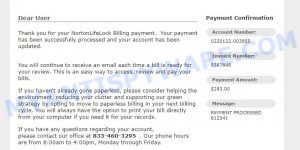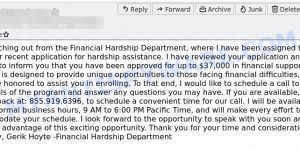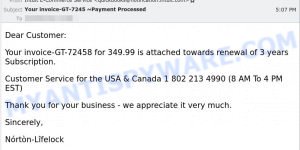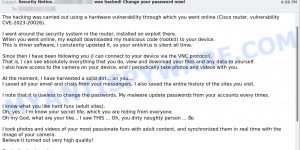Scam emails are becoming increasingly common in our digital age. Many people have received fraudulent messages claiming to be from reputable companies or organizations, asking for personal or financial information. One of the latest examples of such a scam is an email claiming to be from Venmo, a popular digital wallet service. The email warns users that their account has been locked due to multiple failed login attempts and urges them to click on a link to recover their account. However, this email is actually a phishing scam designed to steal users’ login credentials and other sensitive information. In this article, we’ll take a closer look at this Venmo email scam and how to protect yourself from similar scams.
Here’s an example of a scam email claiming to be sent from Venmo (appsx.custs-mailspprtaccnt-venmoidregards):
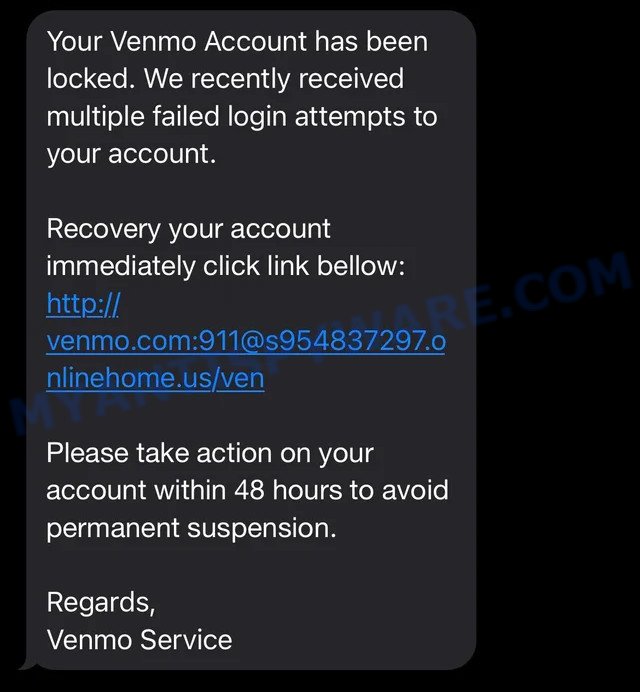
QUICK LINKS
- Venmo Account has been Locked Scam Explained
- How to spot and avoid such scams?
- What to do when you receive the Scam Email?
- Report a Scam
Venmo Account has been Locked Scam Explained
This is a classic example of a phishing scam. The email is designed to look like it came from Venmo, a popular digital wallet service, but it is actually a fake email created by scammers to trick you into giving them your personal and financial information.
The email tries to create a sense of urgency by claiming that your Venmo account has been locked due to multiple failed login attempts and that you must click on a link to recover it. The link provided in the email, however, leads to a fake website that looks like Venmo’s login page but is actually a site designed to steal your login credentials and other personal information.
It’s important to be aware that scammers often use the onlinehome.us domain to host fraudulent websites that mimic legitimate companies or services, such as Venmo. The Venmo email scam provides a link to a website on this domain, which may trick users into entering their personal or financial information. To learn more about the risks associated with onlinehome.us and how to protect yourself from online scams, we recommend reading our article: “Beware of Scams on the onlinehome.us Domain: How to Stay Safe“.
Here’s how the scam works, step-by-step:
- The scammer sends an email that appears to be from Venmo, claiming that the user’s account has been locked due to multiple failed login attempts.
- The email includes a link that the user is urged to click on to recover their account. The link leads to a fake Venmo login page that looks just like the real thing.
- The user enters their login credentials on the fake login page, thinking they are signing into their Venmo account.
- The scammer then collects the user’s login information, which they can use to access the user’s Venmo account and steal money or personal information.
- In some cases, the fake login page may also ask the user to enter additional personal information, such as their name, address, date of birth, or social security number, which the scammer can use for identity theft.
- Once the scammer has collected the user’s information, they may use it to make unauthorized purchases, transfer funds to other accounts, or sell the information on the dark web.
To avoid falling victim to this type of scam, it’s important to be cautious when receiving unsolicited emails, especially those that ask you to click on a link or provide personal or financial information. Always verify the authenticity of the request by contacting the company directly through their official website or customer support channels.
A typical “Venmo Account has been Locked” Scam text reads as follows:
Your Venmo Account has been locked. We recently received multiple failed login attempts to your account.
Recovery your account immediately click link bellow: http://venmo.com:911@s954837297.onlinehome.us/ven
Please take action on your account within 48 hours to avoid permanent suspension.
Regards,
Venmo Service
Examples of such scams
The Venmo Account has been Locked Scam email is an example of a phishing scam that tries to trick people into giving away their personal information or money. Here are some other examples of scams that work in a similar way: NortonLifeLock Billing Payment Email Scam, Avira Assistance PayPal Invoice Scam, and Financial Hardship Department Scam Email and Calls.
- NortonLifeLock Billing Payment Scam Email
- Avira Assistance PayPal Scam Invoice Email
- Financial Hardship Department Scam Email
- Intuit Norton Lifelock Scam Email
- I am a spyware software developer Email Scam
These are just a few examples, but unfortunately, there are many other types of scams out there. It’s important to be vigilant and cautious when receiving any unsolicited emails or offers asking for personal information or payment.
How to spot and avoid phishing scams like the Venmo Account has been Locked Scam

Here are some tips on how to spot and avoid phishing scams like the Venmo Account has been Locked Scam:
- Scammers often use email addresses that mimic legitimate ones but contain slight variations, such as misspellings or added numbers. Make sure to check the email address carefully and verify that it is from a legitimate source.
- Phishing emails often contain spelling and grammar errors or use awkward phrasing that would not be used by a legitimate company.
- If an email contains a link, hover over it with your mouse to see where it leads before clicking on it. If the link appears suspicious or unfamiliar, do not click on it.
- If an email claims that there is a problem with your account, do not provide any personal information until you have verified the claim with the company directly. Contact the company’s customer service department by phone or through their official website to confirm the issue.
- Legitimate companies will never ask for personal information, such as passwords or Social Security numbers, via email. If an email asks for this type of information, it is likely a scam.
- Use two-factor authentication. Two-factor authentication can add an extra layer of security to your online accounts by requiring a code in addition to your password to access your account. This can help prevent unauthorized access even if your password is compromised.
- Make sure to keep your computer’s operating system and antivirus software up-to-date to protect against known security vulnerabilities.
By following these tips, you can help protect yourself from phishing scams and other types of online fraud.
Threat Summary
| Name | Venmo Account has been Locked Scam Onlinehome.us message |
| Type | Phishing Scam |
| Sender | appsx.custs-mailspprtaccnt-venmoidregards |
| Scammers websites | s954837297.onlinehome.us |
| Fake claims | Venmo Account has been Locked and user needs to click on a link to recovery it. |
| Disguise | The message appears to be from Venmo, using the company’s branding and logo to make it seem legitimate. However, it is actually a phishing scam designed to steal personal information. |
| Damage | Scammers can access the recipient’s account, steal personal information, and make unauthorized purchases if they fall for the scam and provide their Venmo login and password. |
| Distribution methods | The scam is distributed via text message, email, or other messaging apps, often with a spoofed address to appear as if it is from Venmo. |
What to do when you receive the Venmo Account has been Locked Scam Email
If you receive the Venmo Account has been Locked Scam Email, here are the steps you should take:
- Avoid clicking on any links in the email, as they may lead to a fake website that is designed to steal your personal information.
- Do not provide any personal information, such as passwords, Social Security numbers, or credit card information, in response to the email.
- Forward the email to phishing@venmo.com to report the phishing attempt.
- Report the scam email to the appropriate authorities, such as the Federal Trade Commission (FTC) at https://www.ftc.gov/ or the Internet Crime Complaint Center (IC3).
- Once you have reported the email, delete it from your inbox and trash folder to avoid accidentally clicking on any links in the future.
- Keep an eye on your Venmo account and other accounts that use the same login information for any signs of unauthorized activity. If you notice any suspicious activity, contact the company’s customer service department immediately. Use the steps (https://consumer.ftc.gov/articles/what-do-if-you-were-scammed) to try to stop a transaction, get a transaction reversed, or get a refund.
- A password manager can help you generate and store unique, strong passwords for each of your online accounts. This can help prevent unauthorized access to your accounts if one password is compromised.
Always be cautious when receiving unsolicited emails and never provide personal information without verifying the legitimacy of the request!
Report a Scam
If you have received the Venmo Account has been Locked Scam text or a message that is similar but not the same as the example above, then post it as comment on this article. Please include the email address the email came from. This helps us to warn users about current scams, monitor trends and disrupt scams where possible.
